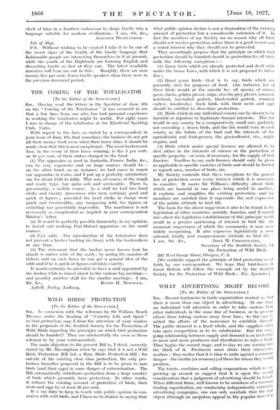WILD BIRDS' PROTECTION
[To the Editor of the SPECTATOR.]
connexion with the reference by Sir William Beach Thomas under the heading of " Country Life and Sport " to bird protection, may I draw the attention of your readers to the proposals of the Scottish Society for the Protection of Wild Birds regarding the principles on which bird protection should be founded? They are substantially the same as those referred to by your correspondent.
The main objection to the present Bill is, I think, correctly stated by Mr. Massingham when he says that it is not a Wild Birds Protection Bill but a Rare Birds Protection Bill ; for outside of the existing close time protection, the only pro- tection hereafter proposed in the Bill is to be given to rare birds (and their eggs) in some danger of extermination. The Bill automatically withdraws protection from a large number of birds which presently have protection. In other words, it reduces the existing amount of protection of birds, their nests and eggs by at least 50 per cent.
It is my duty.-to keep in touch with public opinion in con- nexion with wild birds; and-rhave no IwsitatiOn'in saying that'
what public opinion desires is not a diminution of the existing amount of protection but a considerable extension of it. In fact the members -of my. Society see no reason why all birds should not receive protection unless there is a good reason and a sound interest why they should not be protected.
They accordingly propose that the principle on which bird protection should be founded should be protection for all birds with the following exceptions (1) Game birds which are already protected and dealt with under the Game Laws, with which it is not proposed to inter- fere ; (2) Quasi game birds—that is to say, birds which are presently shot for purposes of food. (An inclusive list of these birds would at the outside be : all species of swans, geese, ducks, golden plover, snipe, also the grey plover, common redshank, bar-tailed godwit, black-tailed godwit, common curlew, woodcock.) Such birds with their nests and eggs should be entitled to close-time protection.
(3) Birds which in any individual county can be shown to be harmful or injurious to legitimate human interests. This list would in any county be a comparatively small one, probably not exceeding a dozen birds, and the list would vary in each county as the habits of the bird and the interests of the agriculturist and fruit-grower, the pisciculturist, etc., might require, and (4) Birds which under special licences are allowed to be shot either in the interests of science or the protection of specific property—or even, if necessary, for the supply of bird fanciers. NeedleSs to say such licences should only be given as applicable to specific varieties of birds and should be limited as regards area, number of birds, etc.
My Society contends that these exceptions to the general law of protection cover every interest which it is necessary to consider. It meets Sir William's difficulty about birds which are harmful in one plaCe being Useful in another; it explains and simplifies the existing protection, and my members are satisfied that it represents the real expression of the public attitude to bird life.
The basis for the above suggestion is also to be found in the legislation of other countries, notably America, and if carried into- effect the legislative establishment 'of this principle would result in a greater quickening of interest in bird life—the economic importance of which the community is now more widely recognizing. It also expresses legislatively a more rational, kindly and compassionate attitude to bird life.— Secretary of the Scottish Society for the Protection of Wild Birds. 207 West George Street, Glasgow, C. 2.
[We cordially support the principle of bird protection as set forth by our correspondent. We hope that bird-lovers in Great Britain will follow the example set by the Scotti.h Society for the Protection of Wild Birds.--ED.' Spectator.]


























































 Previous page
Previous page